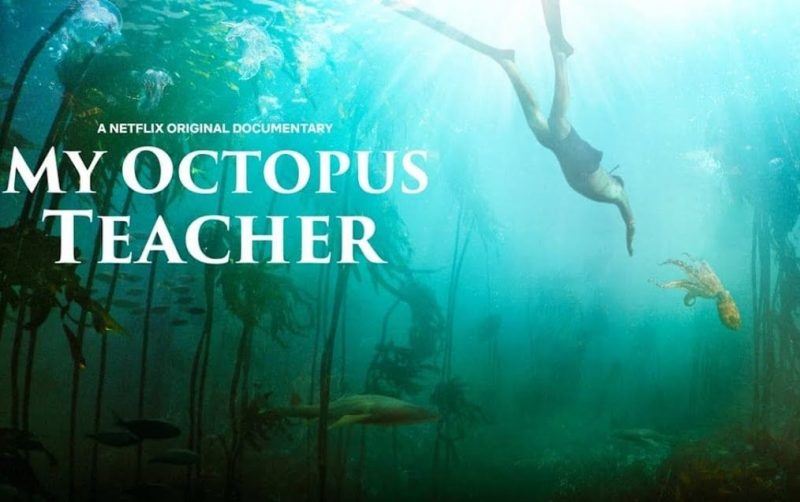Case Study: My Octopus Teacher
I asked my nephew and junior editor Chris, who is becoming a masterful storyteller, to analyze the three-act structure of My Octopus Teacher, which won the 2021 Academy Award for Best Feature Documentary. I’ve added a few story notes in italics to this excellent case study of the classic three act composition. Otherwise it’s all Chris!
KE Story Note: The Inciting Incident is the event that gives rise to the protagonist’s goal.
Chris’s Analysis: Protagonist Craig Foster’s inciting incident was the burnout he felt after two hellish years that left him unable to work or even emotionally connect with others, including his young son. Understanding he could not continue on this way, Craig says “I had to have a radical change.”
Karen’s note: sometimes the catalyst scene is hard to discern, in real life and in films! Craig’s burnout is more accurately the emotional setting of the film. Technically, the inciting incident is a momentin time. It happens at 12 minutes during a dive when the Craig first sees the octopus.
He says, “I remember there was this strange shape to my left and just going down… And then suddenly…” Here we see the octopus spring out of hiding. Craig says on camera, “…I’d witnessed something extraordinary.”
KE Story Note: The first Act Climax occurs at approximately the 25% mark. Here is Chris’s spot on analysis:
This leads Craig back into the ocean waters and into his first encounters with his “Octopus Teacher”. The growing connection culminates in the first act climax when, after slowly building trust, the octopus leaves her den in Craig’s company and touches him for the first time. This thrilling moment happens 21% of the way through the film, and sets the stakes for the trials to come in Act Two.
KE Story Note: The midpoint is a crisis scene halfway through Act Two; it often marks the threshold of character transformation.
The midpoint of the film comes at the 45% mark when a shark attacks the octopus and tears off her arm. This attack on his new love sends Craig into a downward emotional spiral, but at the same time his anguish marks a gradual change toward becoming a more sentimental person.
KE Story Note: Typically at the 75-80% mark, the Act Two Climax is the highest emotional point in the film so far.
This encounter however pales in comparison to the second act climax when the octopus is chased by another shark, only to outsmart it this time by cloaking herself in sea shells. This happens 63 minutes into the 85-minute film, at roughly the 75% mark.
KE Story Note: The Act Three Climax is an event, placed at approximately the 95% mark, that delivers the film’s emotional peak and leads to the protagonist reaching their goal, or not.
While the octopus was able to escape the sharks she would unfortunately meet her end in the Act Three climax, where she dies after hatching her eggs, too weak to flee from the other fish and sharks. This happens at the 83% mark.
KE Story Note: The Protagonist’s Statement of Transformation is a sentence or two in Act Three in which the main character states how they have changed. In documentaries, it’s often something like, “I used to think _______ and now I realize _________.”
But even though the octopus dies, the lessons she left with Craig remain. The protagonist delivers several lines towards the end of the film that sum up how he learned to reconnect with nature and other people. The line that stands out to me is “I was getting so much from the wild and I could actually now give.”
To me this is Craig’s Statement of Transformation, from a person who had given too much of himself to his craft into a man who had learned to both take in the wonders of the world around him and share them with others without diminishing himself.
Karen’s note: Chris is right, there are several statements of transformation in the third act. Here’s another:
“She made me realize just how precious wild places are. You go into that water and it’s extremely liberating…You slowly start to care about all the animals, even the tiniest ones. You realize that every one is very important.”
To learn more, check out why I’m a fan of The Octopus Teacher. – KE
